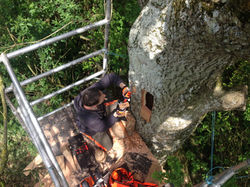
Pertwood Farm Tree Hive
The Natural Beekeeping Trust are teaming up with the wildlife team at Pertwood Organic Farm to create the first tree hive in the UK
Watch trustee Jonathan Powell, trained in the tree beekeeping methods of the old Eastern European tree beekeepers, demonstrate the making of a tree hive from beginning to end.

Tree beekeeping is an ancient form of beekeeping where Zeidler (Tree Beekeepers) create cavities inside living trees and then manage the hive for hundreds of years, passing it from one generation of Zeidler to the next. Historically, the Zeidler never introduced a swarm to a hive, instead they would make the hive as attractive as possible for the bees, respecting their natural preference for warm cavities high in trees, away from interference and the cold of the ground.
A movement to restore the craft of the Zeidler is rapidly taking hold across Europe, but the task of the new Zeidler is to not only entice the bees to the many new tree hive cavities, but to also find habitats where the owners cherish the earth and foster its renewal. Toxic mono crops are deadly to bees, and many modern forests are too barren and devoid of places to nest or forage to collect.
The Trust is delighted to help Pertwood Organic Farm www.pertwood.co.uk create the first Zeidler tree hive in the UK. Pertwood in Wiltshire is a home to people, sheep, cattle, abundant wildlife and is one of the oldest organic farms in the UK.
The chosen tree (pictured left) is next to a large wild flower meadow. The tree is over 100 cm in diameter at the base and we estimate it is over 150 years old. The tree is not harmed in this process (unlike making a box hive!) and will live for many years to come.
Work started on the tree hive May 12th 2016, and was completed the following day.
Within minutes of completing the hive a scout bee went inside to check the hive!
Two days later there were 50 scout bees checking the hive by mid morning, and sure enough at 1pm that day the scouts all left before returning with a swarm of bees ... the calm before the swarm.
1st UPDATE 2019: The bees are now in third year of occupation. The hive is very strong, and we are now providing various 'nesting' boxes around the farm to make new homes for any swarms that issue from the Zeidler hive.
2nd UPDATE 2019: There are now five wild colonies living in log hives, bee boxes and the original Zeidler hive.
 |  |  |
|---|---|---|
 |  |  |
 |  |  |
 |  |  |
 |
Strong colonies of wild unmanaged bees are vital to bee health. Without the testing environment of nature, which has shaped and protected bees for millions of years, bees are at the peril of the short-sighted manipulations of modern beekeeping. These typically focus on narrow goals such as honey production, docility and suppression of natural reproduction. Without a strong reservoir of wild unmanaged colonies it is possible that the UK will follow the path of several European countries, where the wild unmanaged colonies have disappeared and the remaining managed colonies need constant human intervention and treatment to survive. This is why this and other similar projects around Europe are so vital.
We need healthy bees, we must let bees be bees.
There is very little scientific evidence, if any, that natural colonies of bees are a risk to managed apiaries. Indeed, managed apiaries with their horizontal transfer of pathogens, sugar feeding, cold boxes low on the ground, high colony densities, importation of queens unsuitable for our climate, and swarm suppression, are a significant source of sickness and genetic damage to the Bee. Only by respecting their innate preferences can we hope to support, rather than exploit, the honey bee.
Our intention is to create many more extensive unmanaged habitats in forests around the UK and across Europe. For information on how to build a tree hive yourself there is now available an ebook from this link.


Our thanks to Pertwood Organic Farm and Stihl GB for supporting the honey bee.

